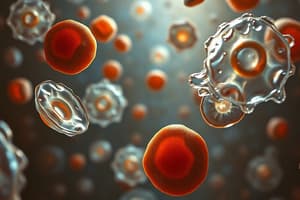Podcast
Questions and Answers
Which cells perform the function of engulfing pathogens and presenting their antigens to trigger an adaptive immune response?
Which cells perform the function of engulfing pathogens and presenting their antigens to trigger an adaptive immune response?
- Eosinophils
- B cells
- Neutrophils (correct)
- T cells
What is the term used to refer to the kind of cell markers or antigens present on the red blood cell (RBC) membranes?
What is the term used to refer to the kind of cell markers or antigens present on the red blood cell (RBC) membranes?
- Blood type (correct)
- Antigen type
- Immune type
- Cell type
Which antigens form the basis of the different ABO blood types?
Which antigens form the basis of the different ABO blood types?
- O, AB, and Rh
- A, B, and O (correct)
- A, AB, and O
- A, B, and Rh
Which type of blood has neither antigen A nor B on RBCs?
Which type of blood has neither antigen A nor B on RBCs?
What is the process called when the antigen and antibody react with each other, causing the blood to clump?
What is the process called when the antigen and antibody react with each other, causing the blood to clump?
Which type of leukocytes do not have visible granules within their cytoplasm?
Which type of leukocytes do not have visible granules within their cytoplasm?
Which blood type has both antigen A and B on RBCs?
Which blood type has both antigen A and B on RBCs?
What is the term used to describe the process when white blood cells migrate out of the bloodstream?
What is the term used to describe the process when white blood cells migrate out of the bloodstream?
Which type of leukocytes account for 25% of WBC and are the smallest leukocyte?
Which type of leukocytes account for 25% of WBC and are the smallest leukocyte?
Which cells are responsible for engulfing and destroying microorganisms or other small particles in the body?
Which cells are responsible for engulfing and destroying microorganisms or other small particles in the body?
What is the process called when phagocytes extend pseudopods around a bacteria and release enzymes to digest it?
What is the process called when phagocytes extend pseudopods around a bacteria and release enzymes to digest it?
Which type of blood antigens can trigger an immune response if they are different from our own?
Which type of blood antigens can trigger an immune response if they are different from our own?
Which cells in the immune system engulf pathogens, process them, and present antigens to trigger an adaptive immune response?
Which cells in the immune system engulf pathogens, process them, and present antigens to trigger an adaptive immune response?
What are the three most important antigens that form the basis of the different ABO blood types?
What are the three most important antigens that form the basis of the different ABO blood types?
What is the process called when phagocytes extend pseudopods around a bacteria and release enzymes from lysosomes to digest it?
What is the process called when phagocytes extend pseudopods around a bacteria and release enzymes from lysosomes to digest it?
Which type of cells have incredible abilities to defend the body?
Which type of cells have incredible abilities to defend the body?
What percentage of white blood cells do lymphocytes account for?
What percentage of white blood cells do lymphocytes account for?
Which type of leukocytes do not have visible granules within their cytoplasm?
Which type of leukocytes do not have visible granules within their cytoplasm?
Flashcards are hidden until you start studying
Study Notes
Phagocytosis, Blood Types, and Leukocytes: Key Facts
- Phagocytosis is the ingestion and destruction of microorganisms or small particles, and it is an important component of the immune system's second line of defense.
- Phagocytes are the cells responsible for phagocytosis, and they include neutrophils, macrophages, and dendritic cells.
- Phagocytosis not only occurs in the innate immune system, but it also plays a role in the adaptive immune system by presenting antigens to trigger an immune response.
- Antigen presenting cells, such as neutrophils, macrophages, and dendritic cells, process pathogens and present peptide fragments on their surface to activate the adaptive immune system.
- Blood type refers to the antigens present on red blood cell (RBC) membranes, and the three most important antigens are A, B, and Rh.
- There are four main blood types: A (antigen A on RBCs), B (antigen B on RBCs), AB (both antigens A and B on RBCs), and O (neither antigen A nor B on RBCs).
- The plasma of the blood may or may not contain antibodies that can react with RBC antigens (A or B), but it never contains antibodies against the antigen present in its own RBC to avoid agglutination.
- Leukocytes, or white blood cells, have various abilities to defend the body, including phagocytosis.
- There are two classes of white blood cells: granulocytes and agranulocytes.
- Agranulocytes, which include lymphocytes and monocytes, do not have visible granules within their cytoplasm.
- Lymphocytes, the smallest leukocytes, account for 25% of white blood cells.
- White blood cells can migrate out of the bloodstream, exhibit amoeboid movement, and are attracted to specific stimuli.
Studying That Suits You
Use AI to generate personalized quizzes and flashcards to suit your learning preferences.




